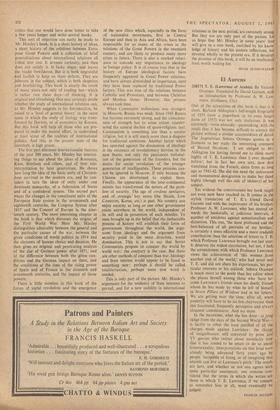El A urens
338171 T. E. (Lawrence of Arabia). By Victoria Ocampo. Translated by David Garnett, with an introduction by Professor A. W. Law. rence. (Gollancz, 15s.) ONE of the attractions of this book is that it is short. Richard Aldington's full-length biography of 1955 (now a paperback in its even longer form of 1957) was not only malicious. It was extremely—even absurdly—painstaking, with the result that it has become difficult to correct the picture without a similar accumulntion of detail. The Argentinian Senora 'Ocampo quotes in a footnote to her study the interesting comment of Harold Nicolson : 'I am obliged to Mr. Aldington for having forced me to think more highly of T. E. Lawrence than I ever thought before'; but in fact her own text, now first translated from the French, dates from as long ago as 1941-42. She did not need the unforeseen and monumental denigration to make her think highly (though well this side of idolatry) of her subject.
Yet without the controversies her book might not even now have reached us. It comes in the stylish translation of T. E.'s friend David Garnett and with the inzprintatur of his brother, Professor A. W. Lawrence, who has steered to- wards the bookstalls, at judicious intervals, a number of antidotes against sensationalism and distortion. This one, 'the most profound and the best-balanced of all portraits of my brother,' is certainly a more effective and a more readable contribution than the selection of letters to T. E. which Professor Lawrence brought out last year. It deserves the widest circulation, but not, I feel, the astonishment with which Professor Lawrence views the achievement of 'this woman from another end of the world,' who had never met T. E. and did not share his experiences, his par- ticular interests or his outlook. Senora Ocampo is much more to the point than her editor when she places herself among those who `have be- come Lawrence's friends since his death; friends whom he has made by what he left of himself in Seven Pillars of Wisdom' and in his letters.' We are getting near the time, after all, when posterity will have to be no less clairvoyant than this fascinated, frequently perceptive and always eloquent commentator. And no more.
In the meantime, what she has done—at ,long range from the days of the Second World War— is tacitly to rebut the least justified of all the charges made against Lawrence: the charge of insignificance, still conveyed by press and TV gossips who twitter about mendacity now that it has ceased to be smart to do so about homosexuality. Interpretations on that level were already being advanced forty years ago bY people 'incapable of living, or of imagining that anyone can live at Lawrence's pitch.' The words are hers, and whether or not one agrees with some particular assessment, one remains con- vinced that the terms in which she writes are those in which T. E. Lawrence, if we consent to remember him at all, must eventually be judged.
FRANCIS WA rsoN






























 Previous page
Previous page